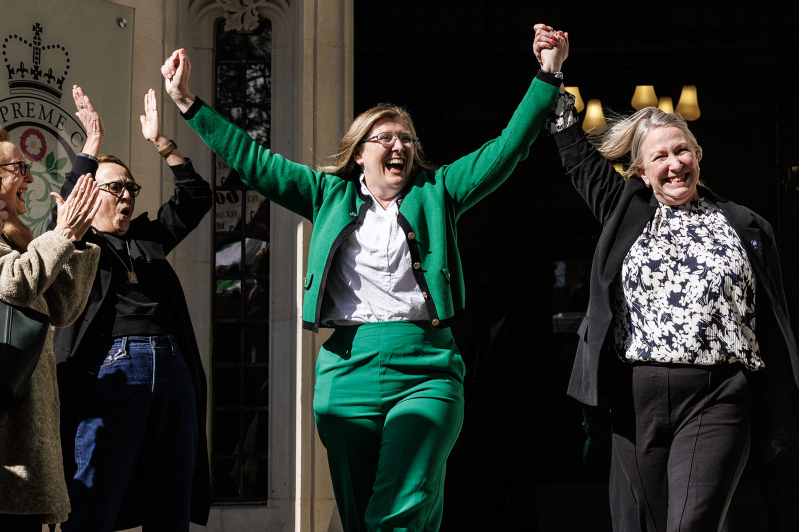
The United Kingdom’s Supreme Court ruled Wednesday (April 16) that the term “woman” under equality legislation refers to biological sex, but said its decision should not be viewed as a setback for transgender rights. Evangelicals have welcomed the decision.
The ruling came in response to a case involving whether a transgender woman with a gender recognition certificate — a document granting legal recognition of a person’s gender identity — is protected from discrimination as a woman under Britain’s Equality Act.
The case, brought by campaign group For Women Scotland, challenged Scottish government guidance accompanying a 2018 law intended to increase the proportion of women on public sector boards. The guidance stated that a trans woman with a gender recognition certificate was legally considered a woman.
After losing in lower Scottish courts, For Women Scotland appealed, and the Supreme Court ultimately ruled in its favor — a decision met with cheers outside the courthouse.
“The unanimous decision of this court is that the terms ‘women’ and ‘sex’ in the Equality Act 2010 refer to a biological woman and biological sex,” said Deputy President of the Supreme Court Patrick Hodge.
“But we counsel against reading this judgment as a triumph for one or more groups in our society at the expense of another — it is not,” he added.
Critics of the Scottish law warned that its broader definition of woman could affect access to single-sex services such as women’s refuges, hospital wards and sports programs. On the other hand, transgender advocates argued that a ruling in favor of For Women Scotland could pave the way for discrimination, particularly in employment.
Hodge addressed those concerns in the ruling.
“The correct interpretation of the EA [Equality Act] as referring to biological sex does not cause disadvantage to trans people, whether or not they possess a gender recognition certificate,” he said. “Trans people have the rights which attach to the protected characteristic of gender reassignment.”
Commenting to Christian Daily International, Peter Lynas, director of the Evangelical Alliance in the United Kingdom (EAUK), said: “The Evangelical Alliance welcomes the decision of the UK Supreme Court that the terms woman and sex refer to a biological woman and biological sex. It is sad that this case was necessary, but the affirmation of biological or creational reality is significant. As the court made clear, this decision protects women, avoids confusion and in no way undermines the rights or value of trans people.”
“The decision should lead to further guidance and widespread review of existing policies based on self-ID. These may take some time to change, but Christians and others should be encouraged to ask about the implication of this decision in their workplaces or educational context,” he added.
In a video posted on X (formerly Twitter), Lynas also noted the cultural shift that has taken place, arguing that the Supreme Court would likely have ruled differently two or three years ago.
The EAUK has previously expressed concern over legal reforms that broaden the definition of gender. In its 2018 resource Transformed: Understanding Transgender in a Changing Culture, the Alliance called for both compassion and theological clarity, stating that “our bodies, created male and female, are integral to our God-given identity.” The guide encourages churches to offer pastoral support while maintaining a biblical view of gender identity.
The Alliance has also publicly opposed moves toward self-identification and the simplification of gender recognition processes. In a 2019 response to Scottish proposals, it raised concerns about potential consequences for safeguarding, religious liberty, and the clarity of legal definitions.
In its formal submission to Parliament, the Evangelical Alliance argued that reforms to the Gender Recognition Act should not undermine the binary understanding of biological sex, which it sees as foundational to law and society.





